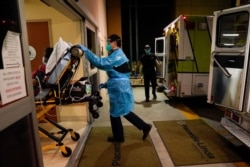A team of World Health Organization scientists investigating the source of the coronavirus, that first emerged in China’s Hubei province in late 2019, visited a provincial disease control center Monday that was key in the early management of the COVID outbreak.
China did not release any details about the team’s visit to the Hubei Provincial Center for Disease Control. Team member Peter Daszak, however, told reporters it had been a “really good meeting, really important.”
Since the WHO team’s arrival last month, the scientists have also visited the Huanan Seafood Market that was linked to a cluster of COVID-19 cases and at least one of the hospitals in Wuhan that treated some of the first patients. COVID-19 is the disease caused by the coronavirus.
The scientists want to know where the virus originated, in what animal and how it made its way into humans — something that could take years to figure out.
"We continue to ask the questions, we continue to push for more data. … It's a detective story," Mike Ryan, top emergency WHO official, told a Geneva news conference Monday.
Maria Van Kerkhove, an American epidemiologist and technical lead on COVID-19 at WHO, said at the news conference that the team is focusing on "the early cases" and "are having very good discussions around that" with their Chinese counterparts.
The outbreak in China led to the worldwide COVID-19 pandemic. The Johns Hopkins Coronavirus Resource Center said Monday there are more than 103 million global COVID-19 infections and more than 2.2 million people have died.
Drop in cases
Cases have fallen worldwide for three consecutive weeks. WHO Director-General Tedros Adhanom Ghebreyesus called the decline "encouraging news" but warned, "We have been here before."
Speaking Monday at the news conference, Tedros said, "Over the past year, there have been moments in almost all countries when cases declined and governments opened up too quickly, and individuals let down their guard, only for the virus to come roaring back."
COVID variant
In Britain, health officials said Monday that 11 people in different regions of England have tested positive for the coronavirus variant first identified in South Africa without any links to people who have traveled.
Health Minister Matt Hancock said those in affected areas need to be tested to break the chain of transmission.
"There's currently no evidence to suggest this variant is any more severe," he said. "But we need to come down on it hard, and we will."
Britain is battling a wave of the virus first identified in the southeast of England. The country's official death toll passed 100,000 last week.
Officials in Madrid, Spain, say they will begin to relax the city's COVID-19 restrictions later this week, even as other parts of Spain are toughening up measures to stop rising infections. Beginning Friday, a 10 p.m. curfew will be extended to midnight, and gatherings of up to six people will be allowed outdoors.
U.S. relief aid
In the United States, U.S. President Joe Biden is meeting with a group of 10 Republican senators who have proposed $618 billion in coronavirus aid, about a third of the price tag of the $1.9 trillion relief bill that he is calling for.
The United States continues to have more cases than anyplace else at more than 26.2 million. India follows with 10.7 million infections, and Brazil comes in third with 9.2 million cases, according to Johns Hopkins.
New cases of COVID-19 in the United States fell for a third week in a row, though more than a million people are still being infected every week, according to a Reuters analysis of state and county reports and Johns Hopkins. Reuters said it is the first time the United States has seen such an extended decline in cases since last September.
A leading U.S. epidemiologist said Sunday he believes the highly contagious and more deadly British strain of the COVID-19 virus could become the dominant strain in the U.S. in the coming weeks, resulting in a surge of infections "like we have not yet seen in this country."
Speaking on NBC's "Meet the Press" Sunday morning news program, Michael Osterholm, who served on Biden's transition coronavirus advisory board, urged the Biden administration and U.S. municipalities to be diligent in inoculating Americans with the COVID-19 vaccines ahead of the "hurricane" of the British variant.
Vaccination efforts
The European Union announced Sunday that British company AstraZeneca agreed to send 9 million more doses of the vaccine to EU countries.
AstraZeneca will also deliver the doses a week earlier than planned, EU Commission President Ursula von der Leyen said on Twitter, calling the news a "step forward on vaccines."
On the African continent, only a handful of countries have been able to begin vaccinating their populations.
South Africa's first coronavirus vaccine doses arrived Monday. President Cyril Ramaphosa and other top officials were at the O.R. Tambo International Airport to receive the 1 million shots of the AstraZeneca vaccine.
On Sunday, Ghana announced it planned to acquire 17.6 million doses by summer, with the first batches arriving by March. It did not say which vaccine the country is getting.
"Our aim is to vaccinate the entire population, with an initial target of 20 million people," President Nana Akufo-Addo said Sunday.
He also announced stricter measures against the virus, including banning large gatherings, as the country battles a second wave.









